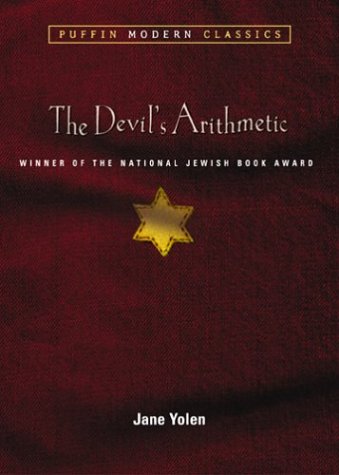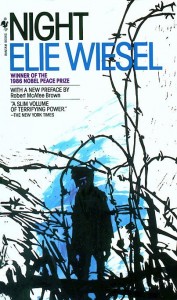 I was recently browsing in a book store, and couldn’t help overhearing the conversation between a mother and her teenage daughter right next to me. The daughter was looking for a new book to read, and her mother was offering guidance on the titles she thought would interest her daughter.
I was recently browsing in a book store, and couldn’t help overhearing the conversation between a mother and her teenage daughter right next to me. The daughter was looking for a new book to read, and her mother was offering guidance on the titles she thought would interest her daughter.
The daughter picked up Jane Yolen’s The Devil’s Arithmetic.
That’s an amazing book, I thought to myself.
But when the teenager showed it to her mother, the woman said, “Oh… Um, that’s about the Holocaust.”
The daughter looked down at the book.
“Do you know about the Holocaust?” the mother asked.
“No,” the daughter said.
“You don’t want to,” the mother said. She took the book from her daughter’s hands and placed it back on the shelf.
I was speechless. I may still be, but I’m going to attempt to gather my thoughts and respond to this experience here because it involves both history and literature, and those are two subjects I’m pretty passionate about.
History first. I know that most everyone has heard the saying that “those who forget history are doomed to repeat it.” But sadly, that’s become a white-noise aphorism in spite of that fact that it is very, very true. Making sure that no one remembers the Holocaust is a precondition to perpetrating it, or something like it, again.
We cannot allow those events to be forgotten. Understanding how Hitler was able to marshal an entire nation and incite such violence and hatred is critical if we are to safeguard our society against such men in the future. Hitler’s genocidal campaign against the Jewish people and his war against Europe did not spring up overnight. Those “final” atrocities represented the culmination of years of calculation, strategy, and propaganda. The record of Hitler’s social, political, and military agenda offers us a thorough list or warning signs if we choose to look at it. Averting our eyes from it because it is uncomfortable is simply not an option. But that is exactly what the mother in the bookstore chose to do.
 Which brings to me literature. One of the greatest books I read in high school was Night by Elie Wiesel. In my English class, we were given a list of books to choose from and, unlike the mother in the book store, my parents encouraged me to read Night. They took me to the bookstore and bought me my own copy. Night became a defining book in my development, one of the greatest lessons I have ever received on the potential for evil in this world, and our potential to rise above it.
Which brings to me literature. One of the greatest books I read in high school was Night by Elie Wiesel. In my English class, we were given a list of books to choose from and, unlike the mother in the book store, my parents encouraged me to read Night. They took me to the bookstore and bought me my own copy. Night became a defining book in my development, one of the greatest lessons I have ever received on the potential for evil in this world, and our potential to rise above it.
I must put aside the fact that a teenage girl did not know about the Holocaust (the failings of our education system could be the subject of innumerable blog posts). What concerns me more was how her mother saw this very wide gap in her daughter’s knowledge of the world and chose not to fill it in, but to protect it. And assuming the best intentions, that’s probably just what that mother thought she was doing – protecting her daughter. She undoubtedly wanted to shelter her child from at least some of the ugliness and brutality that exist all around us. But what would happen if an entire generation of children knew nothing of the Holocaust? The irony, of course, is that The Devil’s Arithmetic is about a modern girl who is taken back in time to bear witness to the events of the Holocaust so they will not be forgotten.
Contrary to how it might sound, I am not saying that this mother should have bought Yolen’s book for her daughter. It is a parent’s right to determine what their child is ready for. I know I certainly would have made a different decision, like my parents did for me. What better way to introduce the Holocaust to a teen than a YA novel written by one of our greatest living storytellers? But that teenage girl is not my daughter.
What I am saying is this: that mother absolutely should have found a way to educate her child. A different book perhaps, if she did not find The Devil’s Arithmetic appropriate for some reason. But she should have done something.
I know from my own experience how enlightening books can be, especially in dealing with some of the harsher aspects of life. The Holocaust was and is something so evil as to be incomprehensible to me, but Night helped me to at least partially grasp those events. More importantly, Night helped me to understand what I could learn from those events without living through them, myself. That is the power of books, and at times, the history they contain.
3 responses to “Why History is Important”
Interesting post, Matt. I’m sitting here stunned that a mother would take a book like Devil’s Arithmetic out of her child’s hands.
Not ready? If she’s in her teens, how could she not be ready to enlarge her understanding and compassion by experiencing a mild version of the horrors that happened then? So many Holocaust books helped me learn to feel pain with another person, taught me to think carefully about all possible consequences of the way I behave and treat others: Anne Frank, the Hiding Place, Man’s Search for Meaning, to name just a few. I spent a long time bawling through these books, aching for the people in them, wondering if I would have been as brave as some, if I would have retained my dignity, or if I had a touch of prejudice and would have been the one to turn away from those in need. I know reading Wiesel’s Night was a powerful experience for my own teenage daughter. She treasures that book.
I’m sure the mother was well-meaning–we’re all just bumbling along, doing our best as parents, aren’t we? But when you take away from a child a book that could make her think deeply about life and past tragedies like the Holocaust, you deprive her of a chance to discover her own humanity.
That’s nothing but tragic, in my book.
Well said, Elena. I completely agree. My initial reaction to the mother was much less sympathetic than what I arrived at here. I try and assume the best in people, or at least the best intentions.
I used to shake my head about such matters as a mother acting the way you describe, but I’m a little more circumspect in my old age. Of course, I’ve been to Germany, visited at least one death camp (Dachau), contemplated the horror there, read Night a couple of times, Ann Frank, The Hiding Place, etc. I don’t own too many movies, but one I own and re-watch from time to time among those few is Schindler’s List.
In the preface to the addition of Night I own, Eli Wiesel says:
Despite how diligent we might be in getting information and providing that information to others, it is the individual that decides whether to receive it. Force feeding does not work very well. Neither the starvation. The girl will read the book if she decides to. In fact, depending upon the girl and her relationship with her mother, the mother’s attitude against her reading it may have a greater impact upon her reading it than her not reading it. And you know what? The mother might know just that. I doubt it, but it’s possible.
And how about us? What is our responsibility? When we see what you saw in the bookstore there, do we have any responsibility? Are we supposed to see that the girl gets a smuggled copy to read with plenty of encouragement? Are we supposed to challenge the mother — perhaps not then and there, but at some other time so that her relationship with her daughter isn’t impacted more adversely? Are we supposed to go out and proselytize with vim and vigor that everybody should read this and learn this lesson?
Or are they to be left in the dark? To vanish into that night? I wish I knew.